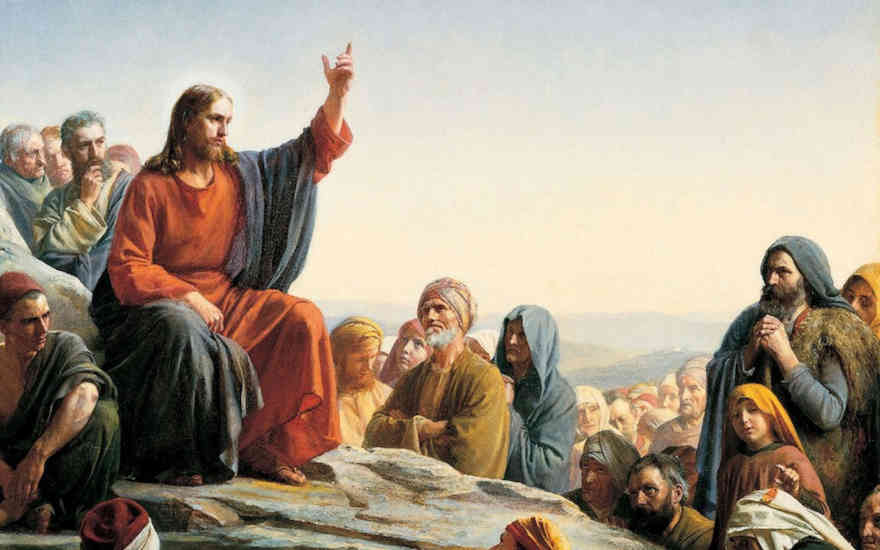
Jesus tells his disciples: “Blessed are you who are poor. Blessed are you who are hungry. Blessed are you who weep now. Blessed are you when people hate you, revile you, exclude you and defame you.” Clearly, Luke is setting an agenda for Jesus.
This is the Messiah that has come for ‘all’ but who clearly cares for the poor. The four beatitudes in Luke’s Gospel are followed by four ‘woes’ for those who are rich. How could Jesus who has come for ‘all’ now start excluding some?
The kingdom of God is mysterious, but from today’s Gospel we know some of those who will be in it. The poor and the hungry will be there. So will those who weep, and also the dominated, the persecuted, the outcasts of the earth. What an extraordinary group! Those who are at the bottom of the human pyramid will be rejoicing and leaping for joy at God’s goodness to them.
At first, it might seem that Jesus is teaching the moral virtues of financial poverty and the evils of financial wealth. The first beatitude in today’s Gospel is, “Blessed are you who are poor, for yours is the kingdom of God. The first woe is, “But woe to you who are rich, for you have received your consolation.” This certainly sounds as though Jesus is promoting poverty as good and wealth as evil.
But, what is the meaning of this word, poor? Does it mean that the wealthy are not welcome in the reign of God? Would God actually exclude someone because he was materially rich? Perhaps this was Jesus’ way of saying that the reign of God is not limited to an ‘in’ group, but that it is open to all who seek salvation. Membership in the poor of God is not dependent on social class, but upon willingness to become disciples of Jesus.
However, becoming a disciple of Jesus is not just a verbal commitment, it requires action, and the action demanded is sometimes difficult and uncomfortable. It is often said that Jesus came to ‘comfort the afflicted and afflict the comfortable.’
It is easy to take our blessings for granted until the difficult times come and we begin to experience the woes of life. During painful and difficult times, it is almost natural to lose sight of the many ways we also are blessed.
When we are struggling with the woes, it may be helpful to sit down and focus on the blessings we are experiencing at this time. This may give us some perspective. We may realize that even during this pandemic, life may not be what we would like it to be but we receive many blessings every single day. True, they may seem like small blessings: a smile, a phone call from a friend, the beauty of the sunset or a hug from someone you love, but they still are blessings. When you are in the woes of life, look for beauty, laughter, or quiet, or ask God for a hug! Who knows: you may be surprised what gift you may receive!
Today’s Gospel paints a confusing picture of life. Is there ever a peaceful moment? – there is, but it takes faith; it takes realism. It takes preparation. It takes vision.
God’s mercy means doing justice for the poorest and the most humiliated. Jesus meets families on his travels that are barely surviving and are defenseless against powerful landowners. We too see poor and powerless people today. Are we, his followers, protectors of the poor?
Poverty is not an illness. Misery is an illness. And the miserable can be anyone: King and peasant; young and old; rich and poor; beautiful and ugly; employed and unemployed.
As we saw from the very beginning of Luke’s gospel, he is offering his “orderly account” in order to confirm his community in what they have learned about Jesus. And a big part of what Luke wants to teach his community about Jesus is that the poor matter. That God loves all people but has a special concern for those who are suffering – the hungry, the poor, those who mourn, and those who are excluded. Jesus has come for those in need – real physical, emotional, concrete need – and Luke’s not about to soften that… not even to make us feel better.
The Beatitudes are often described as a framework for Christian living. Our vocation as Christians is not to be first in this world, but rather to be first in the eyes of God.
What meaningful action will I do today to bring a smile to the lips of someone who is poor or broken? Christian living is neither an armchair occupation nor a spectator sport.
We are challenged to examine our present situation:
- How can our lives be simpler?
- How can we depend more on God?
- How can we begin to notice the poor?
- What are the things money can’t buy?
Dear God, make us mindful of those with less; more than that, use us to demonstrate your love and special concern for all those who suffer.
–Dcn. Terry Murphy

